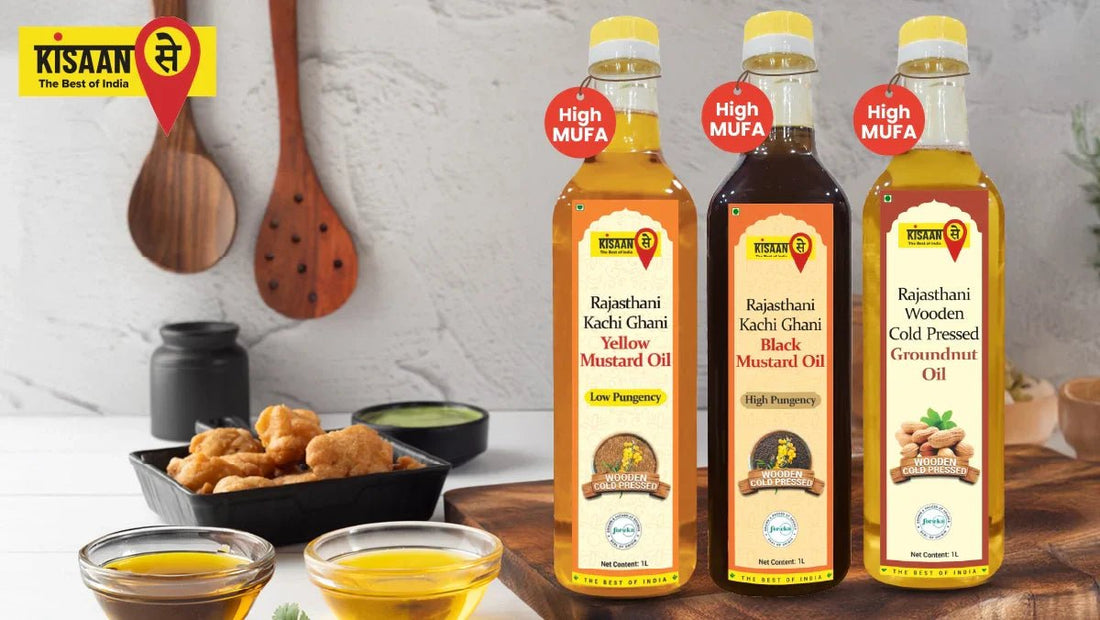
Cold-Pressed vs Wood-Pressed Oil: What’s the Difference?
Share
Introduction:
When it comes to healthy cooking oils, terms like “cold-pressed” and “wood-pressed” are gaining popularity—but many people still confuse the two. Both methods avoid high heat and chemical solvents, preserving the oil’s natural nutrients. However, there are key differences in how they’re extracted, their health impact, and taste profiles. Let’s break down the comparison so you can choose the right oil for your kitchen.
What is Cold-Pressed Oil?

- Cold-pressing involves mechanically crushing oil seeds (like mustard, groundnut, or coconut) at low temperatures (below 40°C).
- No external heat or chemicals are used.
- The oil is filtered using natural sedimentation or cloth filtration.
- Retains antioxidants, vitamins, and fatty acids.
What is Wood-Pressed Oil (Kachi Ghani)?

- A traditional method where seeds are slowly crushed using a wooden pestle (known as a “ghani”).
- The rotation is slow (usually ~6-8 RPM) and generates minimal heat.
- Often considered more natural and rooted in Ayurvedic practices.
- Also known as “lakdi ghani” oil in many parts of India.
Cold-Pressed vs Wood-Pressed – Key Differences

Which One is Better for You?
Both oils are better than refined oils—but here’s when to choose which:
- Choose Cold-Pressed: If you want a versatile, clean-tasting oil for everyday cooking with longer shelf life.
- Choose Wood-Pressed: If you prefer traditional methods, deeper flavours, and Ayurvedic benefits.
How to Identify Authentic Oils
- Look for labels: “Cold-Pressed” or “Wood-Pressed (Lakdi Ghani)” clearly mentioned.
- Check packaging date and source region.
- Avoid oils with additives, preservatives, or deodorants.
- Choose vacuum-packed or filtered oils for better freshness.
KisaanSay’s Promise of Purity

- Oils are extracted at low temperature using cold-pressing only.
- Sourced from indigenous, chemical-free oilseeds.
- No solvents, no heat, no additives.
- Vacuum-packed at source to preserve aroma and freshness.
FAQs
Q1: Is cold-pressed oil healthier than regular refined oil?
Yes. It retains more nutrients and antioxidants and is free from chemicals.
Q2: Is wood-pressed the same as cold-pressed?
Not exactly. Both avoid heat, but wood-pressed uses a wooden pestle, which is slower and more traditional.
Q3: Can I use cold-pressed oil for deep frying?
Yes, especially mustard and groundnut cold-pressed oils with high smoke points.
Q4: Why does wood-pressed oil look cloudier?
It’s often unfiltered or minimally filtered—this doesn’t affect quality.
Final Thoughts
Both cold-pressed and wood-pressed oils are far superior to refined varieties. Choosing either means choosing health, tradition, and taste. At KisaanSay, we make it easy for you to access pure, farm-pressed oils that preserve the soul of your food.
Conclusion
Switch to KisaanSay’s cold-pressed oils – pure, ethical, and full of flavour.
Explore Oils Now https://kisaansay.com/collections/ghee-oils

